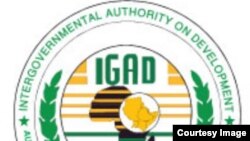JUBA —
Peace talks for South Sudan have been adjourned until later this month after a second round of negotiations failed to make progress toward ending the conflict that has claimed thousands of lives and displaced nearly a million people in the young country.
Officials from the Intergovernmental Authority on Development (IGAD), the regional body that has been mediating the talks in Addis Ababa, announced late Monday that the negotiations have been suspended until March 20.
In a statement, the regional bloc said both sides will have a chance during the adjournment to consult documents that will guide the negotiations going forward. IGAD also plans to solicit views on the peace process from civil society organizations during the two-week break.
But South Sudan government spokesman Michael Makuei Lueth said the talks are on the brink of failing.
He blamed the breakdown of the second round, which had been inching forward since it began on February 10, on IGAD mediators. He said negotiators will have to go back to South Sudan empty-handed.
"It was our hope that we will come back to our people with peace, but unfortunately this did not go as planned," he said.
"And this is not because of anything to do with the parties, but I strongly believe that it was the envoys – the negotiators – who became an obstacle, other than the rebels with whom we want to negotiate,” he said.
The government side also felt there were too many people involved in the talks, including seven former political prisoners who were participating as a third party.
"We demanded from the envoys that these people should not be included. Instead, the envoys insisted and told us that was the red line,” he said.
Youanis Musa, a spokesman for the anti-government side, said the opposition was unhappy with the slow pace of the negotiations.
"It’s like we are given a rest after we have been in Addis and studied all the proposals of IGAD," Musa said.
"When we come back next time, we don’t need to sit idle again, like we did this time. We need to have issues to be discussed,” he said.
Musa said opposition negotiators have no problem with multiple parties being involved in the negotiations, as long as the process moves forward quickly.
Opposition negotiators have been "given a free mandate by our head, Dr. Riek Machar, to sign and to reach an agreement with any party we meet,” he said.
The first round of negotiations ended in late January, with the signing of a cessation of hostilities pact and an agreement to expedite the release of 11 political figures who were detained when the unrest erupted in Juba on Dec. 15.
The cessation of hostilities has been repeatedly violated since it was agreed to and four of the political detainees remain in prison in Juba, accused of treason for their role in what President Salva Kiir has said was a failed bid to oust him, led by former vice president Machar.
Officials from the Intergovernmental Authority on Development (IGAD), the regional body that has been mediating the talks in Addis Ababa, announced late Monday that the negotiations have been suspended until March 20.
In a statement, the regional bloc said both sides will have a chance during the adjournment to consult documents that will guide the negotiations going forward. IGAD also plans to solicit views on the peace process from civil society organizations during the two-week break.
But South Sudan government spokesman Michael Makuei Lueth said the talks are on the brink of failing.
It was our hope that we will come back to our people with peace, but unfortunately this did not go as planned.Michael Makuei Lueth, South Sudan Government Spokesman
"It was our hope that we will come back to our people with peace, but unfortunately this did not go as planned," he said.
"And this is not because of anything to do with the parties, but I strongly believe that it was the envoys – the negotiators – who became an obstacle, other than the rebels with whom we want to negotiate,” he said.
The government side also felt there were too many people involved in the talks, including seven former political prisoners who were participating as a third party.
"We demanded from the envoys that these people should not be included. Instead, the envoys insisted and told us that was the red line,” he said.
Youanis Musa, a spokesman for the anti-government side, said the opposition was unhappy with the slow pace of the negotiations.
"It’s like we are given a rest after we have been in Addis and studied all the proposals of IGAD," Musa said.
"When we come back next time, we don’t need to sit idle again, like we did this time. We need to have issues to be discussed,” he said.
Musa said opposition negotiators have no problem with multiple parties being involved in the negotiations, as long as the process moves forward quickly.
Opposition negotiators have been "given a free mandate by our head, Dr. Riek Machar, to sign and to reach an agreement with any party we meet,” he said.
The first round of negotiations ended in late January, with the signing of a cessation of hostilities pact and an agreement to expedite the release of 11 political figures who were detained when the unrest erupted in Juba on Dec. 15.
The cessation of hostilities has been repeatedly violated since it was agreed to and four of the political detainees remain in prison in Juba, accused of treason for their role in what President Salva Kiir has said was a failed bid to oust him, led by former vice president Machar.








